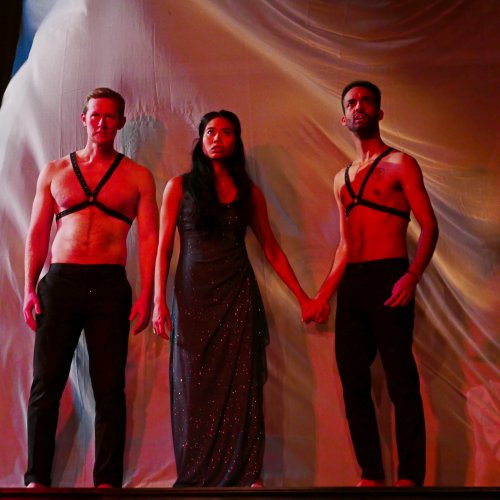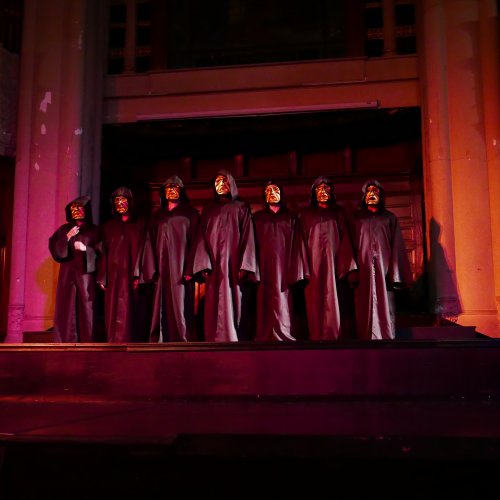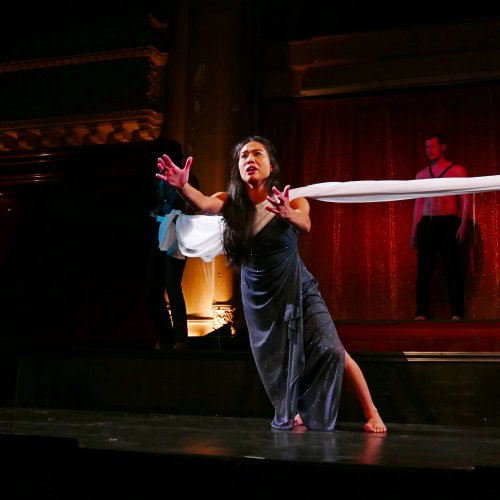Love, Medea
This new version of an ancient tale of love and murder works to limit the work’s imperiousness, but its cheeky antics may go too far for some viewers.

Francesca Fernandez McKenzie and Company of Peter Gray’s “Love, Medea” at The Center at West Park (Photo credit: Hunter Gause)
[avatar user=”Mark Dundas Wood” size=”96″ align=”left”]Mark Dundas Wood, Critic[/avatar]
Love, Medea, presented by split/decision, is a new take on the well-known ancient Greek myth. It’s meant to make the fearsome protagonist more understandable on a human level than was the case in the Euripidean version (staged in 431 BC). Written by Peter Gray and directed by Michael Alvarez, the new play aims to cut through the mythological fog in order to tell the tale not as a grand tragedy but as the story of an ordinary woman who finds herself doing monstrous things in a cruel world. As Gray puts it, early on:
No one lives in the land of myths,
yet those are the stories
we harvest
and swallow,
lustful for another verse.
The humanization of Medea is an admirable as well as an ambitious task, though, to be fair, Euripides actually depicted human behavior more realistically than fellow Greek playwrights Aeschylus and Sophocles. Whether the presentation of Medea’s psychology would seem more valid here if made by a female playwright and a female director is a question that will likely occur to many who see the show. Still, it’s refreshing to see a version that scales back the heavy pageantry we associate with Greek tragedy in order to reach contemporary audiences.

Nolan Burke as Jason, Francesca Fernandez McKenzie as Medea and Aaron Jay Green as Absyrtus in a scene from Peter Gray’s “Love, Medea” at The Center at West Park (Photo credit: Hunter Gause)
The production is unapologetically irreverent. At the beginning, we see a masked Greek chorus wearing long robes, shuffling ever-so-slowly around the stage of the Center at West Park (the sanctuary of a Presbyterian church). The leader of the chorus eventually speaks to us in staid, stentorian tones from behind his gold mask. But soon the actors (all male) strip off the robes. They’re bare-chested, save for leather harnesses that look as though they could have been purchased from a local kink boutique. Costume designer Yuanyuan Liang obscures the men’s faces with black head coverings, giving them the look of hostage takers or executioners.
Early scenes deal in large part with the unhappy relationship of Medea (Francesca Fernandez McKenzie) with her father, King Aestes of Colchis (Michael Raver), along with the more satisfying one with her twin brother, Absyrtus (Aaron Jay Green). Later, Jason (Nolan Burke) shows up, on his quest for the fabled Golden Fleece. He marries Medea but eventually decides he wants to wed another woman. As in Euripides’ rendition, this leads to Medea’s notorious acts of violence, including the killing of her children.
Gray’s language is poetic and assured, and Alvarez’s staging is imaginative, making use of the entire sanctuary. Choreographer Mara Driscoll’s contributions add immensely to the show’s energy and pacing.

The Company of Peter Gray’s “Love, Medea” at The Center at West Park (Photo credit: Hunter Gause)
However, be warned that the creators of the show take a postmodern approach to the material. Along with Gray’s quite lyrical passages are others with anachronistic language and imagery, which—again—disrupt the notion that the Medea story should be something hifalutin. At one point, the celebrated fleece is referred to as a “little yellow blanket” that “makes grown men go gaga and shit themselves.” There are references also to “trigger warnings” and “resting bitch face.”
More significantly, the production features audio, video and live segments that reference I Love Lucy, Casablanca, The Sound of Music, and Julia Child–style cooking shows. Some audience members will view these antics as playful cheekiness. Others—including, maybe, those who have grown up with plays that employ such hodgepodgery as a matter of course—may find it all to be a bit old hat. (A few attendees may also recall A.R. Gurney’s one-act play, The Golden Fleece, which added modern elements to the Medea myth way back in the mid-1960’s.)
The shifting approaches in Love, Medea give the talented McKenzie significant acting challenges, and she meets them adeptly, whether her Medea is downstage interacting with members of the audience or upstage making love with Jason to lantern light inside a cocoon-like pod created by the show’s manifestation of the Golden Fleece: a huge piece of white, gauze-like fabric that, at other times, billows like a sail or wraps into a rope-like strand that restrains the title character. In any case, McKenzie was apparently game for just about anything, and her stable, assured performance helps smooth the seams at which the various styles and moods of the production are stitched together.

Francesca Fernandez McKenzie (with Nolan Burke in rear) in a scene from Peter Gray’s “Love, Medea” at The Center at West Park (Photo credit: Hunter Gause)
Raver, Green and Burke make lesser impressions than McKenzie. However, they, along with members of the ensemble—Dwayne Brown, Héctor Cerna and Lukasz Zięba—do good work collectively, especially in their execution of Driscoll’s choreography.
The liturgical nature of the cavernous playing space is highly suitable for a work with ties to ancient religious observances. Anna Driftmier is credited with set design, although it’s unclear to what extent the venue has been adjusted to accommodate the show. Perhaps her main task was facilitating the various transmutations of the fleece. Daniela Fresard Montero’s lighting design is mostly fine, but why, at the performance under review, did the lights on the masked figures at the top of the show keep flashing? It seemed as though something was literally on the blink.
John Millerd’s sound design deserves special mention. At times it is the actual heartbeat of the production. It was impossible, during the performance in question, to determine whether the loud sirens heard occasionally were part of Millerd’s soundtrack or were coming from outside the building. If the latter was the case, then the gods were, for once, doing their job, as sirens seemed perfectly suited to the dramatic actions taking place.
Love, Medea (through January 18, 2020)
split/decision
The Center at West Park, 165 West 86th Street, in Manhattan
For tickets, visit http://www.centeratwestpark.org/events/love-medea
Running time: one hour and 40 minutes without an intermission






Leave a comment